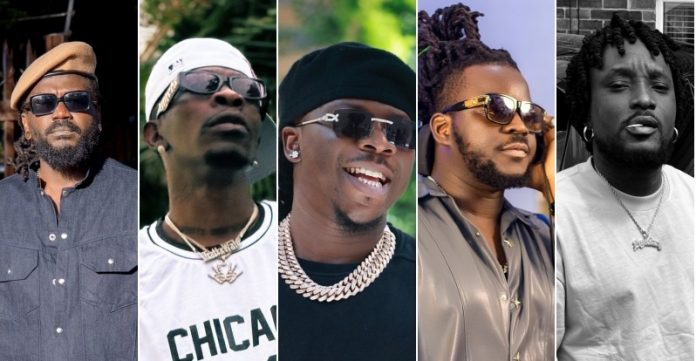Dancehall is a genre of Jamaican popular music that emerged in the late 1970s and early 1980s, evolving from reggae, but with a faster rhythm, more digital production, and grittier lyrics.
Dancehall as a genre in Ghana has influenced music, language, fashion, youth identity, social expression, and even politics.
It has grown into a global cultural force, influencing fashion, language, and music styles due to the concious effects being made by some Ghanaian artistes.
We will focus on some male Ghanaian artistes who have made significant contributions in the dancehall fraternity between 2013-2019.
RENAISSANCE & EXPANSION ERA (2013–2019)
SAMINI

Veteran Ghanaian dancehall musician Samini is the first Ghanaian artiste to win a MOBO Award due to his unique way of blending dancehall with Ghanaian languages and hiplife.
With his hit song “Linda” which was released in 2004, Samini gained recognition as a Ghanaian artiste who was showing great improvement is the dancehall genre.
Often referred to as one of the originators of modern Ghanaian dancehall, Samini was the first to blend Jamaican-style dancehall with Ghanaian rhythms and languages in a way that made the genre palatable to the mainstream.
Samini’s style appealed across regions, age groups, and classes which made dancehall more accessible to Ghanaian audiences, especially those unfamiliar with Jamaican patois.
Samini laid the foundation for Ghanaian dancehall as a respected genre and showed that dancehall could be both conscious and commercially viable.
SHATTA WALE

Shatta Wale is known as the Dancehall King who has made massive and transformative contribution to Ghanaian dancehall with his aggressive marketing, grassroots, and prolific output.
He is widely credited with reviving, commercializing, and revolutionizing the genre, turning Ghanaian dancehall into a cultural, economic, and musical powerhouse.
Shatta Wale’s collaborations with Beyoncé, Alkaline, Vybz Kartel, Skillibeng, and other Jamaican artistes resulted in several hits which helped spotlight Ghanaian dancehall on the global reggae/dancehall map.
His influence is felt across generations, both as a hitmaker and as a symbol of independence and street empowerment.
STONEBWOY

Stonebwoy’s contribution to Ghanaian dancehall is monumental, especially in terms of global recognition, artistic evolution, professionalism and is widely regarded as the torchbearer of conscious and internationally respected dancehall in Ghana.
He introduced a more refined, global-friendly version of dancehall and was the first Ghanaian artiste to achieve consistent international acclaim.
Stonebwoy focuses on social issues, motivation, African identity, and positivity in his songs blending dancehall with reggae, Afrobeat, and even highlife in an appealing way to any listener.
He became a model of discipline, humility, and professionalism by incorporating live bands into dancehall shows which raised the bar in live performance quality in the dancehall genre. He also prioneered the Afro-Dancehall style.
Jupitar

Jupitar is one of the most respected names in Ghanaian dancehall, known for his lyrical dexterity, vocal range, and authenticity who has made significant artistic contributions to the genre.
Often described as the “Lyrical General” of Ghanaian dancehall, Jupitar is known for his clean, authentic Jamaican-style delivery and patois fluency which has helped in maintaining a pure dancehall identity.
He has upheld the genre’s original sound, prioritized lyrical substance, and quietly built a strong legacy based on skill, authenticity, and artistic consistency.
EPIXODE

Epixode is a multi-talented dancehall and reggae artiste knownn for his strong visual identity, cultural representation, and artistic innovation in Ghanaian music scenes.
He represents a new-age, culturally conscious form of dancehall that blends art, performance, and tradition through the use of local languages like Ga, Ewe, and Akan.
Epixode is a visual artist, cultural curator, and modern-day griot who has redefined what dancehall can look and feel like in Ghana, using dancehall as a canvas to paint both sound and identity.
Dancehall now influences Afrobeats, pop, Latin reggaeton, and even trap in Ghana due to the efforts of these artistes and many more.
Story by: Abdul Rahman Tinagyei.



